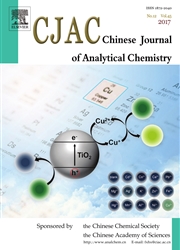

 中文摘要:
中文摘要:
建立了一种利用光致聚合反应制备微纳流体器件的新方法,并开展了相应的痕量富集实验研究:建立描述光致聚合反应中引发剂分解、自由基消耗、聚合反应等的理论模型,利用COMSOL软件计算分析了微尺度凝胶光致聚合反应过程,获得凝胶纳米筛宽度随曝光时间和光强的变化规律;以倒置荧光显微镜为平台,通过聚焦和分光等控制手段,在微流道的特定区域实现孔密度可调的凝胶纳米筛集成,形成微纳流控芯片;以Poisson-Nernst-Planck模型为基础,对纳流体电动富集过程进行计算,确定纳孔密度与富集倍率的关系;利用制备的芯片开展纳流体电动富集实验,发现前驱液中单体丙烯酰胺与交联剂N,N'-亚甲基双丙烯酰胺质量比为9∶1时,对痕量异硫氰酸荧光素(Fluorescein isothiocyanate,FITC)小分子的富集倍率达到600倍。
 英文摘要:
英文摘要:
A new method for fabricating micro-nanofluidic devices through photopolymerization was developed and related experimental research on trace enrichment was undertaken. COMSOL software was utilized to calculate and analyze the gel photopolymerization process in microscale and a mathematical model of photopolymerization including photoinitiator decomposition, radical consumption, polymerization, etc. , was established. The influence of the exposure time and the light intensity on gel nanosieve width was investigated. With an inverted fluorescence microscope, the micro-nanofluidic chip was prepared by integrating pore density-tunable gel nanosieves into specific areas of the microchannels through focusing, beam splitting and other control means. Based on the Poisson-Nernst-Planck model, the process of nanofluid-based electrokinetic enrichment process was simulated numerically, and the relationship between nanopore density and concentration ratio was investigated. Utilizing the prepared chips, the experiments of nanofluid-based eleetrokinetic enrichment were performed and the enrichment ratio of fluorescein isothiocyanate (FITC) could reach 600-fold as the mass ratio of the monomer aerylamide and the erosslinker N,N'-methylenebisacrylamide was 9: 1.
 同期刊论文项目
同期刊论文项目
 同项目期刊论文
同项目期刊论文
 Effects of electrophoresis and electroosmotic flow on ion enrichment in micro-nanofluidic preconcent
Effects of electrophoresis and electroosmotic flow on ion enrichment in micro-nanofluidic preconcent Monolithic integration of three-material microelectrodes for electrochemical detection on PMMA subst
Monolithic integration of three-material microelectrodes for electrochemical detection on PMMA subst Fabrication of SU-8 moulds on glass substrates by using a common thin negative photoresist as an adh
Fabrication of SU-8 moulds on glass substrates by using a common thin negative photoresist as an adh A three-layer PMMA electrophoresis microchip with Pt microelectrodes insulated by a thin film for co
A three-layer PMMA electrophoresis microchip with Pt microelectrodes insulated by a thin film for co Integrated Pt2Ni alloy@Pt core-shell nanoarchitectures with high electrocatalytic activity for oxyge
Integrated Pt2Ni alloy@Pt core-shell nanoarchitectures with high electrocatalytic activity for oxyge Carboxyl functionalized gold nanoparticles in situ grown on reduced graphene oxide for micro-gravime
Carboxyl functionalized gold nanoparticles in situ grown on reduced graphene oxide for micro-gravime Package-friendly piezoresistive pressure sensors with on-chip integrated packaging-stress-suppressed
Package-friendly piezoresistive pressure sensors with on-chip integrated packaging-stress-suppressed Three Dimensional PtRh Alloy Porous Nanostructures: Tuning the Atomic Composition and Controlling th
Three Dimensional PtRh Alloy Porous Nanostructures: Tuning the Atomic Composition and Controlling th Fully front-side bulk-micromachined single-chip micro flow sensors for bare-chip SMT (surface mounti
Fully front-side bulk-micromachined single-chip micro flow sensors for bare-chip SMT (surface mounti Fabrication of two dimensional polyethylene terephthalate nanofluidic chip using hot embossing and t
Fabrication of two dimensional polyethylene terephthalate nanofluidic chip using hot embossing and t A novel hybrid patterning technique for micro and nanochannel fabrication by integrating hot embossi
A novel hybrid patterning technique for micro and nanochannel fabrication by integrating hot embossi Adsorption induced surface-stress sensing signal originating from both vertical interface effects an
Adsorption induced surface-stress sensing signal originating from both vertical interface effects an Recent advances in preparation and application of hybrid organic-silica monolithic capillary columns
Recent advances in preparation and application of hybrid organic-silica monolithic capillary columns Monolithic Integration of Pressure Plus Acceleration Composite TPMS Sensors With a Single-Sided Micr
Monolithic Integration of Pressure Plus Acceleration Composite TPMS Sensors With a Single-Sided Micr Nanopore density effect of polyacrylamide gel plug on electrokinetic ion enrichment in a micro-nanof
Nanopore density effect of polyacrylamide gel plug on electrokinetic ion enrichment in a micro-nanof Analysis of Polymer Viscoelastic Properties Based on Compressive Creep Tests During Hot Embossing fo
Analysis of Polymer Viscoelastic Properties Based on Compressive Creep Tests During Hot Embossing fo Repulsively driven frequency-increased-generators for durable energy harvesting from ultra-low frequ
Repulsively driven frequency-increased-generators for durable energy harvesting from ultra-low frequ Precise extension-mode resonant sensor with uniform and repeatable sensitivity for detection of ppm-
Precise extension-mode resonant sensor with uniform and repeatable sensitivity for detection of ppm- Porous-layered stack of functionalized AuNP-rGO (gold nanoparticles-reduced graphene oxide) nanoshee
Porous-layered stack of functionalized AuNP-rGO (gold nanoparticles-reduced graphene oxide) nanoshee Bi-stable frequency up-conversion piezoelectric energy harvester driven by non-contact magnetic repu
Bi-stable frequency up-conversion piezoelectric energy harvester driven by non-contact magnetic repu Single-Side Fabricated Pressure Sensors for IC-Foundry-Compatible, High-Yield, and Low-Cost Volume P
Single-Side Fabricated Pressure Sensors for IC-Foundry-Compatible, High-Yield, and Low-Cost Volume P A chelating-bond breaking and re-linking technique for rapid re-immobilization of immune micro-senso
A chelating-bond breaking and re-linking technique for rapid re-immobilization of immune micro-senso 期刊信息
期刊信息
